-
 Bitcoin
Bitcoin $103,528.9455
1.74% -
 Ethereum
Ethereum $2,640.2435
8.75% -
 Tether USDt
Tether USDt $0.9998
-0.04% -
 XRP
XRP $2.5553
4.71% -
 Solana
Solana $179.9792
7.01% -
 BNB
BNB $660.2916
2.69% -
 USDC
USDC $0.9997
-0.04% -
 Dogecoin
Dogecoin $0.2386
9.03% -
 Cardano
Cardano $0.8165
5.03% -
 TRON
TRON $0.2716
3.73% -
 Sui
Sui $3.9640
3.22% -
 Chainlink
Chainlink $17.1893
6.51% -
 Avalanche
Avalanche $26.0265
10.40% -
 Stellar
Stellar $0.3105
4.05% -
 Shiba Inu
Shiba Inu $0.0...01608
8.14% -
 Hedera
Hedera $0.2124
5.09% -
 Pi
Pi $1.2611
19.49% -
 Toncoin
Toncoin $3.4395
7.21% -
 Hyperliquid
Hyperliquid $25.4158
7.55% -
 Polkadot
Polkadot $5.1776
6.78% -
 UNUS SED LEO
UNUS SED LEO $8.7878
2.26% -
 Bitcoin Cash
Bitcoin Cash $408.3998
3.95% -
 Litecoin
Litecoin $103.3464
2.61% -
 Monero
Monero $346.8209
4.15% -
 Pepe
Pepe $0.0...01399
7.81% -
 Bitget Token
Bitget Token $4.8001
3.92% -
 Dai
Dai $0.9998
-0.02% -
 Ethena USDe
Ethena USDe $1.0004
-0.04% -
 Uniswap
Uniswap $6.8937
5.19% -
 Bittensor
Bittensor $460.5593
3.00%
How to prevent backup loss through decentralized storage strategies?
Decentralized storage, using platforms like IPFS, Sia, Arweave, or Filecoin, offers resilient backups by distributing data across multiple nodes. However, cost, accessibility, and complexity require careful planning, encryption, and diversification for optimal protection.
Mar 05, 2025 at 02:36 am
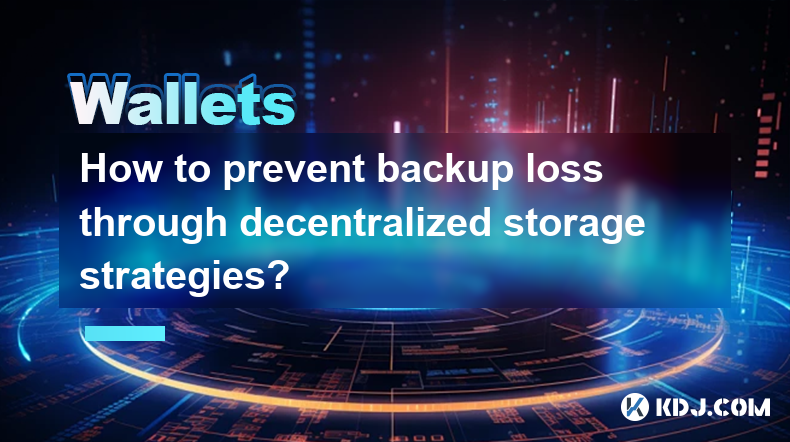
Key Points:
- Decentralized storage offers resilience against single points of failure inherent in centralized backups.
- Multiple strategies exist, each with trade-offs in cost, security, and accessibility.
- Careful selection of a decentralized storage provider and implementation of robust security practices are crucial.
- Understanding the limitations of each approach and diversifying your backup strategy is essential for comprehensive protection.
How to Prevent Backup Loss Through Decentralized Storage Strategies?
Losing your cryptocurrency backups is a catastrophic event. Centralized cloud storage, while convenient, presents a single point of failure. Decentralized storage offers a more resilient alternative, distributing your data across multiple nodes, minimizing the risk of complete data loss. However, implementing a robust decentralized backup strategy requires careful planning and execution.
One popular approach is using IPFS (InterPlanetary File System). IPFS is a peer-to-peer distributed file system that stores data across a network of nodes. By pinning your backup to multiple IPFS nodes, you increase the likelihood of data retrieval even if some nodes fail. Remember, pinning costs vary depending on the provider and storage duration.
Another option is Sia, a decentralized cloud storage platform. Sia utilizes a blockchain to ensure data integrity and availability. Users can rent storage space from a distributed network of hosts, offering redundancy and security. However, understanding Sia's pricing model and choosing reliable hosts is vital for effective backup management.
Arweave is another decentralized storage solution that focuses on permanent storage. Arweave uses a novel “Proof-of-Access” consensus mechanism to incentivize nodes to retain data indefinitely. This approach is ideal for long-term backups of crucial cryptographic keys and seed phrases, although the cost per byte may be higher than other options.
Filecoin is a decentralized storage network built on a blockchain. It incentivizes users to provide storage, creating a robust and redundant network. Users can choose from various storage providers, selecting options based on price, reputation, and storage capacity. Careful selection of reputable providers is essential to ensure data reliability.
Implementing a Decentralized Backup Strategy:
The implementation involves several steps:
- Choose a Decentralized Storage Provider: Select a provider that aligns with your needs and budget (IPFS, Sia, Arweave, Filecoin, etc.). Consider factors such as cost, storage capacity, and network resilience.
- Encrypt Your Backup: Before uploading, encrypt your backup using a strong encryption algorithm and securely store your encryption key separately. This protects your data even if a storage provider is compromised.
- Split Your Backup: Divide your backup into smaller, manageable chunks and store them across multiple providers or different nodes within a single provider. This further reduces the risk of total loss.
- Regularly Verify Your Backup: Periodically check the integrity and accessibility of your backups. This ensures your data remains intact and retrievable. Note that some providers offer tools for this verification.
- Use a Multi-Signature Wallet: Consider using a multi-signature wallet for enhanced security of your crypto assets. This requires multiple private keys to authorize transactions, reducing the risk of unauthorized access even if one key is compromised.
Understanding the Limitations:
While decentralized storage offers significant advantages, it's not without limitations.
- Cost: Decentralized storage can be more expensive than centralized solutions, especially for large backups. Costs can fluctuate depending on the provider and network demand.
- Accessibility: Retrieving data from decentralized storage can be slower than from centralized solutions, especially for large files. Network congestion can also impact accessibility.
- Complexity: Setting up and managing a decentralized backup strategy can be more complex than using centralized cloud services.
Common Questions and Answers:
Q: Is decentralized storage completely secure?
A: No storage solution is perfectly secure. While decentralized storage significantly reduces the risk of single points of failure, it's still vulnerable to attacks. Strong encryption and diverse strategies are crucial.
Q: How do I choose the right decentralized storage provider?
A: Consider factors such as cost, reputation, storage capacity, network resilience, and the provider's track record. Research thoroughly before committing.
Q: What happens if a decentralized storage provider goes out of business?
A: If a provider shuts down, your data might be inaccessible unless you've pinned it to multiple nodes or used multiple providers. This highlights the importance of redundancy.
Q: Can I use decentralized storage for all my backups?
A: Decentralized storage is suitable for critical backups like cryptocurrency keys and seed phrases. For other data, consider a hybrid approach combining decentralized and centralized solutions.
Q: Is it difficult to retrieve my data from decentralized storage?
A: Retrieval can be more complex than centralized storage, requiring familiarity with the chosen provider's tools and protocols. However, many providers offer user-friendly interfaces to simplify the process.
Q: What are the best practices for securing my decentralized backups?
A: Use strong encryption, split your backups across multiple providers, regularly verify the integrity of your backups, and utilize multi-signature wallets where applicable. Maintain updated and secure software.
Q: How much does decentralized storage cost?
A: Costs vary significantly depending on the provider, storage capacity, and duration. Some providers offer free tiers for smaller amounts of data, while others charge based on usage or storage capacity. It's crucial to check pricing models before committing.
Disclaimer:info@kdj.com
The information provided is not trading advice. kdj.com does not assume any responsibility for any investments made based on the information provided in this article. Cryptocurrencies are highly volatile and it is highly recommended that you invest with caution after thorough research!
If you believe that the content used on this website infringes your copyright, please contact us immediately (info@kdj.com) and we will delete it promptly.
- Man Finds 1469 Roman Coins Buried in a Romanian Field
- 2025-05-14 12:05:13
- VanEck Launches VBILL, a Tokenized Fund That Enables Access to Short-Term US Treasuries On-Chain
- 2025-05-14 12:05:13
- United States President Donald Trump Will Probably Trigger an Indirect Crypto Market Rally
- 2025-05-14 12:00:31
- MEXC Points to Bitcoin Dominance Drop and Ethereum's Surge as Signs of a Coming Altcoin Season
- 2025-05-14 12:00:31
- Looking to Buy the Next Big Cryptocurrency? These 3 Cryptos Could Skyrocket This Year
- 2025-05-14 11:55:13
- Bitcoin Set for “Mega Expansion” as Chart Signals Parabolic Price Spike
- 2025-05-14 11:55:13
Related knowledge
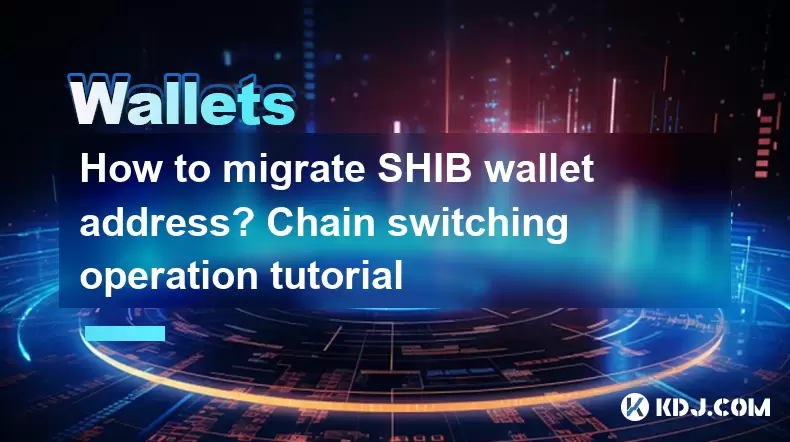
How to migrate SHIB wallet address? Chain switching operation tutorial
May 14,2025 at 07:35am
Migrating your SHIB wallet address and performing a chain switching operation can be crucial for managing your cryptocurrency effectively. This process involves several steps that need to be followed carefully to ensure that your assets remain secure and accessible. In this tutorial, we will guide you through the process of migrating your SHIB wallet ad...
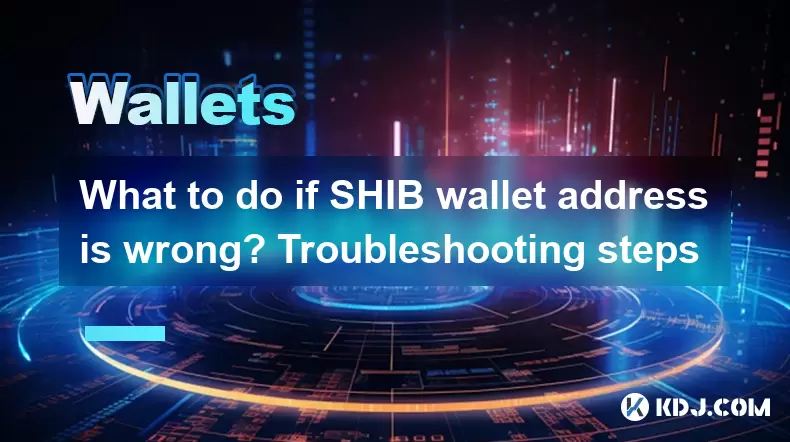
What to do if SHIB wallet address is wrong? Troubleshooting steps
May 14,2025 at 04:28am
If you've entered the wrong SHIB wallet address, it can be a stressful situation, especially if you've already sent your SHIB tokens. However, there are several steps you can take to troubleshoot and potentially resolve the issue. Let's walk through the process step-by-step. Verify the Transaction DetailsThe first thing you should do is verify the trans...
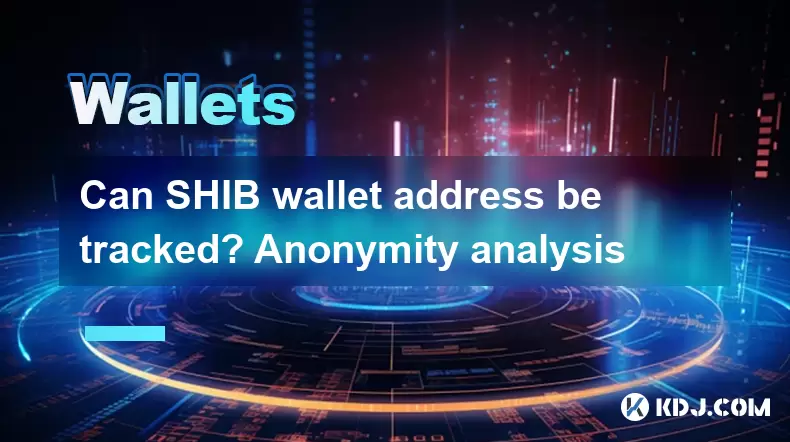
Can SHIB wallet address be tracked? Anonymity analysis
May 14,2025 at 06:50am
The question of whether a SHIB wallet address can be tracked and the level of anonymity it provides is a crucial concern for many users in the cryptocurrency space. SHIB, or Shiba Inu, is a popular meme token that operates on the Ethereum blockchain. Understanding the traceability of SHIB wallet addresses involves delving into the nature of blockchain t...
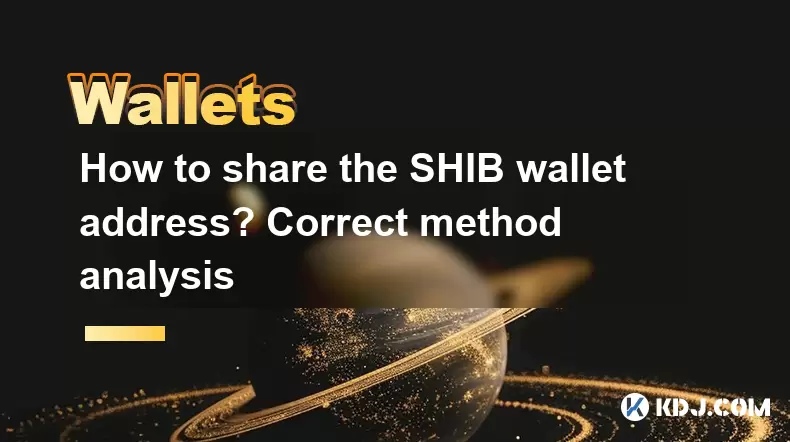
How to share the SHIB wallet address? Correct method analysis
May 14,2025 at 02:50am
Sharing your SHIB wallet address is a common task for those involved in the cryptocurrency world, particularly if you're dealing with Shiba Inu (SHIB) tokens. However, it's crucial to understand the correct methods to share your wallet address to ensure the safety and security of your funds. This article will guide you through the process and highlight ...
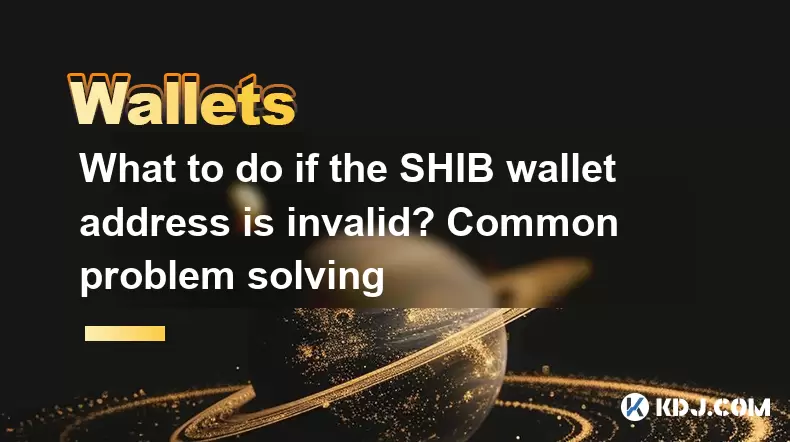
What to do if the SHIB wallet address is invalid? Common problem solving
May 14,2025 at 09:14am
If you're dealing with an invalid SHIB wallet address, it can be a frustrating experience, especially if you're trying to send or receive SHIB tokens. Understanding why this happens and how to solve it is crucial for anyone involved in the cryptocurrency space. This article will guide you through the common issues associated with an invalid SHIB wallet ...
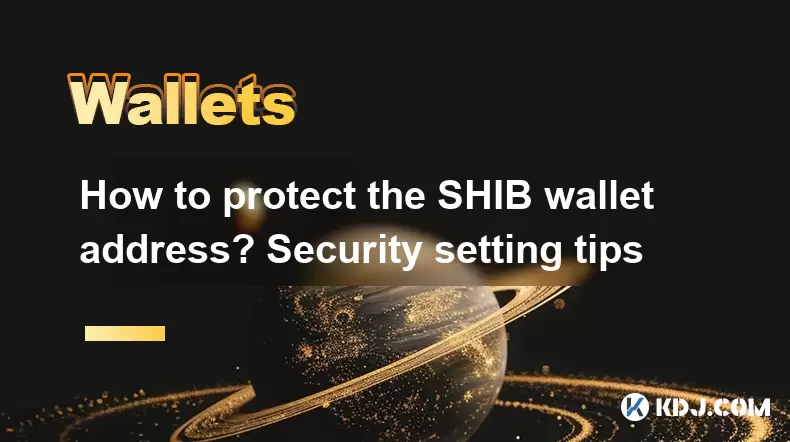
How to protect the SHIB wallet address? Security setting tips
May 13,2025 at 04:07pm
Protecting your SHIB wallet address is crucial to safeguarding your cryptocurrency assets. With the rise of digital currencies, securing your wallet has become more important than ever. This article will provide you with detailed security setting tips to ensure your SHIB wallet remains safe from potential threats. Understanding SHIB Wallet SecurityBefor...

How to migrate SHIB wallet address? Chain switching operation tutorial
May 14,2025 at 07:35am
Migrating your SHIB wallet address and performing a chain switching operation can be crucial for managing your cryptocurrency effectively. This process involves several steps that need to be followed carefully to ensure that your assets remain secure and accessible. In this tutorial, we will guide you through the process of migrating your SHIB wallet ad...

What to do if SHIB wallet address is wrong? Troubleshooting steps
May 14,2025 at 04:28am
If you've entered the wrong SHIB wallet address, it can be a stressful situation, especially if you've already sent your SHIB tokens. However, there are several steps you can take to troubleshoot and potentially resolve the issue. Let's walk through the process step-by-step. Verify the Transaction DetailsThe first thing you should do is verify the trans...

Can SHIB wallet address be tracked? Anonymity analysis
May 14,2025 at 06:50am
The question of whether a SHIB wallet address can be tracked and the level of anonymity it provides is a crucial concern for many users in the cryptocurrency space. SHIB, or Shiba Inu, is a popular meme token that operates on the Ethereum blockchain. Understanding the traceability of SHIB wallet addresses involves delving into the nature of blockchain t...

How to share the SHIB wallet address? Correct method analysis
May 14,2025 at 02:50am
Sharing your SHIB wallet address is a common task for those involved in the cryptocurrency world, particularly if you're dealing with Shiba Inu (SHIB) tokens. However, it's crucial to understand the correct methods to share your wallet address to ensure the safety and security of your funds. This article will guide you through the process and highlight ...

What to do if the SHIB wallet address is invalid? Common problem solving
May 14,2025 at 09:14am
If you're dealing with an invalid SHIB wallet address, it can be a frustrating experience, especially if you're trying to send or receive SHIB tokens. Understanding why this happens and how to solve it is crucial for anyone involved in the cryptocurrency space. This article will guide you through the common issues associated with an invalid SHIB wallet ...

How to protect the SHIB wallet address? Security setting tips
May 13,2025 at 04:07pm
Protecting your SHIB wallet address is crucial to safeguarding your cryptocurrency assets. With the rise of digital currencies, securing your wallet has become more important than ever. This article will provide you with detailed security setting tips to ensure your SHIB wallet remains safe from potential threats. Understanding SHIB Wallet SecurityBefor...
See all articles






















































































